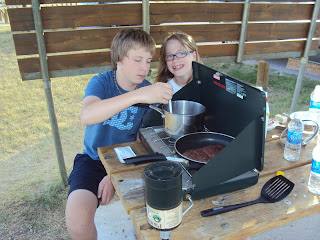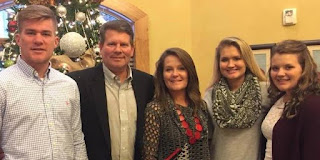Starlight in the Badlands
In 2010 my kids and I took a summer road trip to South Dakota. Over the course of six days we saw all of the familiar sites - the Corn Palace, Crazy Horse, Mt. Rushmore, Wall Drug, et cetera - and took advantage of all of the familiar photo opportunities. One picture, however, went untaken. My Sony Cyber-shot just couldn't do the image justice.
We spent the second night of the trip camping in the heart of the Badlands - probably the most stunning piece of land in all of South Dakota. Now I'm not much of a camper. Somehow, all I ever manage to pack is cold wieners and Old Dutch potato chips. Fortunately, my son is an Eagle Scout and has easily overcome my camping shortcomings. So, thankfully, the cooking duties fell to him. After a full day of sight-seeing and a full belly in the Badlands, we turned in with the nightfall, eager to push on to Mount Rushmore in the morning.
As luck (or an enlarged prostate) would have it, I had to relieve myself at 2:30am that night. I was not alone. Nature was calling my daughter as well. We briefly fumbled around for a flashlight, quickly unzipped and re-zipped the tent (the grasshoppers were everywhere) and emerged into the total darkness of the Badlands.
With one exception.
Above us was a sight that I had only seen before in pictures. My daughter and I were dizzy with wonder. Living so long in the unnatural nighttime haze of an urban metropolis had denied us this stunning view with our own eyes. It was our home galaxy - the Milky Way. As we dodged (and stepped on) an occasional grasshopper, the only word either of us could speak was a repeated and reverential, "Wow."
We saw many wonders during that trip but - for me - that sight topped all others. In the complete blackness surrounding us, the Milky Way created an effect of weightlessness, as if my daughter and I were swimming - transfixed but untroubled - in a sea of fireflies. To this day I can recall that moment of gazing upward, feeling so insignificant and yet so happily in awe of the vastness of space.
As a kid, I was an outer space junkie. The thought of humans one day exploring distant stars and distant planets strongly appealed to me. That won't happen in my lifetime - nor in the lifetime of many, many of my descendants, if ever. So instead, humanity has ingenuously found a more cost-effective way to explore the heavens. Rather than going out into deep space, we are bringing deep space back to us - via the Hubble Telescope.
The Hubble Telescope's images - sharp, illuminating, impossibly large in scope - can be as frightening as they are wondrous. Its man-made lenses have peered more than 13 billion years back in time to the distant origins of our Universe, whose light has traveled that many years to reach a small orbital device circling a small planet that circles a medium-sized star that swirls with 300 billion other stars (look it up) in a typical galaxy along with more than 100 billion sister galaxies (look it up again) in a known Universe that is ever-expanding. Sigh.
Given the sheer size and scope of what lies "out there," mankind would be naïve to believe that we are alone in the Universe. The odds against life elsewhere are rather small. Then again, the odds of having just the right conditions that allows life to flourish on our planet appear equally slim. A little too close or too far from the Sun - not to mention billions of other variables necessary for existence - and Earth is a wasteland.
So what's this all about, this talk of starlight in the Badlands? It's about Science and Faith. Humans have an instinctual need to learn ever more about two seemingly incompatible concepts - how things work (species, ecosystems, planets, galaxies) and who made them work in the first place (God, a Supreme Being, Intelligent Design, Random Chance). Is it simply our nature to pursue such knowledge, or was that desire placed within us by something much greater than ourselves?
Obviously, some of our religious traditions would be shattered by the discovery of extra-terrestrial life in any form. Some basic foundational beliefs would crumble under the weight of inconsistency with scientific evidence. Others less so. Still, I equally admire and am puzzled by people who have such faith-based certainty in the concept of my God only exclusivity - despite the contradictions that the Universe presents them and those same beliefs. Meh. No matter.
This must be what happens to someone approaching middle-age. Mortality creeps in on a gentle Saturday morning. I thought I would have more answers and certainty by now - turns out I have fewer and less of both. And I'm kind of okay with that. There should be room for all of us - it's a big (and growing bigger every day) Universe after all - our different faiths, our differing beliefs and non-beliefs, our doubts and our certainties. And our Science.
Still, when thoughts turn fatalistic and to the possibility that Science alone is the only player in the creation, formation and continuation of this thing we call Existence, I consider the concept of beauty. Contemplating love, the perfect harmony of untrammeled Nature or great works of art, literature and music - I ask myself, "Could all of this beauty - be it faith-based or scientific - be random?"
Not a chance.
So what's this all about, this talk of starlight in the Badlands? It's about Science and Faith. Humans have an instinctual need to learn ever more about two seemingly incompatible concepts - how things work (species, ecosystems, planets, galaxies) and who made them work in the first place (God, a Supreme Being, Intelligent Design, Random Chance). Is it simply our nature to pursue such knowledge, or was that desire placed within us by something much greater than ourselves?
Obviously, some of our religious traditions would be shattered by the discovery of extra-terrestrial life in any form. Some basic foundational beliefs would crumble under the weight of inconsistency with scientific evidence. Others less so. Still, I equally admire and am puzzled by people who have such faith-based certainty in the concept of my God only exclusivity - despite the contradictions that the Universe presents them and those same beliefs. Meh. No matter.
This must be what happens to someone approaching middle-age. Mortality creeps in on a gentle Saturday morning. I thought I would have more answers and certainty by now - turns out I have fewer and less of both. And I'm kind of okay with that. There should be room for all of us - it's a big (and growing bigger every day) Universe after all - our different faiths, our differing beliefs and non-beliefs, our doubts and our certainties. And our Science.
Still, when thoughts turn fatalistic and to the possibility that Science alone is the only player in the creation, formation and continuation of this thing we call Existence, I consider the concept of beauty. Contemplating love, the perfect harmony of untrammeled Nature or great works of art, literature and music - I ask myself, "Could all of this beauty - be it faith-based or scientific - be random?"
Not a chance.






Comments
Post a Comment